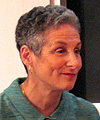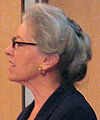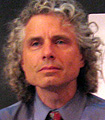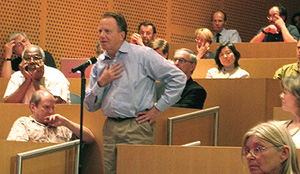The Future of the Digital Commons Thursday,
September 22, 2005 |
|||
|
Arguments and legal confrontations over the control of music, writing and visual materials have become a permanent feature of contemporary life and will almost certainly enlarge and intensify in future years. As corporate producers and distributors — including some universities and private libraries — move aggressively to claim ownership of digital content of all kinds and as some industries lobby for building surveillance principles into the operating systems of computers, others defend an alternative vision. This alternative embraces ideals of sharing and civic community and warns that recent extensions of copyright threaten creativity and the free exchange of ideas. Is there a future for this idea of a digital commons? Is the American tradition of free public libraries a valuable precedent for the digital age? Is the commercialization of cyberspace already a problem for those seeking reliable information? Are there features or tendencies inherent in digital technology that will always challenge and even undermine efforts to control information or charge a fee for accessing it? Our speakers and our audience will engage these and related questions. Nancy Kranich served as president of the American Library Association in 2000-2001, focusing on the role of libraries in democracies. In 2003-2004, she was a senior research fellow at the Free Expression Policy Project in New York, where she wrote The Information Commons: A Public Policy Report . Previously, she was associate dean of libraries at New York University where she managed NYU's libraries, press, and media services. Steven Pinker has long been committed to the democratic and civic uses of technology, especially the Internet. He is the Johnstone Family Professor of Psychology at Harvard University, and the author of many essays and books, including The Language Instinct (1994) and The Blank Slate: The Modern Denial of Human Nature (2002). Ann Wolpert is director of MIT Libraries and a member of the MIT Committee on Copyright and Patents. She also chairs the management board of the MIT Press and the board of directors of Technology Review, Inc., which publishes Technology Review. A webcast of The Future of the Digital Commons is available from MIT World. Librarians have been at the center of many public policy controversies recently. In the '80s, we fought to get free access to government information. In the '90s, the ubiquity of pornography on the Internet led some to accuse us of running peep shows. Also in the '90s, we faced the controversy of who owns which information, and we were accused of being pirates. Throughout all of this, librarians have steadfastly promoted freedom of information.
One thing that keeps librarians successful is our ability to reframe these debates. Instead of focusing just on what we don't like, we offer solutions. For instance, we rethought the debate on the publicity versus privacy of information. We framed the debate in terms of creativity, participation, and trust, not just privacy and pornography. As we begin the 21st-century, one important way that librarians can contribute is through the creation of a digital commons. We already share resources as a society, like parks and libraries. Let's build a similar shared structure for information, so we can manage, create, and maintain it together. Many people and groups support the idea of shared resources as a communal good. We have a civic commons for spreading information and enabling discourse around the democratic process. We have digital libraries, open source software, a learning commons. We have information networks for people with shared interests, like knitting. But it is difficult to legally share creative works, so let's build a creative commons. We have laws such as copyright that restrict the flow of information, whether or not the author requires the rights to her content. We must design legal ways of sharing access, not just restricting it. Much of the scholarly work that the academy is creating is expensive and difficult to obtain. Let's look at ways to share information for free. Scholars can do this without ceding the rights to their work. As a result, more people will access and cite their research. In this time of transition, we have an opportunity to create institutions that will manage resources in a sustainable way and spread shared values like democratic participation. The Commons will be one of the models by which we share information in the future. Ann Wolpert My personal library includes books, but also digital archives. These digital archives inform me as I do what I do. Every endeavor relies on prior work, and thus access to common resources is crucial to innovation and creativity. I therefore have a stake in ensuring my free and easy access to digital information in the future.
Technology and the Internet have changed the rules. Peer-to-peer networks have changed the way many share music. As a result, we have seen corresponding policy changes, like the Digital Millennium Copyright Act and the music industry's fervent pursuit of pirates. However, ideas are not consumed as is a Popsicle. Once a Popsicle is eaten, it cannot be reused. With ideas, the more society uses them the less likely they are to disappear. No one owns the Internet -- everyone does. As a result, markets and governments no longer solely control the spread of information. Should all information be controlled if it can be? Copyright is a traditional control mechanism that gives you rights whether or not you want them. I signed a release tonight permitting my comments to be recorded and made available as a video stream on the Internet because I'm not concerned with protecting these words. Hollywood and the recording industry dominate how we think about copyright and sharing information. Yet their goals are different from the academy's. License agreements supersede copyright law, so academic journals and societies sometimes tell professors not to give away their papers. Many fields benefit greatly from a freer flow of ideas. Where would architecture be if architects copyrighted building forms? They decided to participate in social sharing, as have science, engineering, and creative writing. Social sharing can coexist with markets and government. Consider how happily bookstores coexist with libraries. And now we have Google Print, offering the full text of many public domain books. Universities have incentives to use social sharing, as open work gets cited more frequently. Math papers, for example, are referenced 91 times more frequently if published on the open web. Finally, MIT's mission statement commits it to creating, disseminating, and preserving knowledge for the benefit of society. If our work goes into a closed system, we have to ask ourselves if we're meeting that commitment. We can all help ensure the free spread of information. Use open source software. Lobby for limits to copyright -- the length of automatic protection we get is excessive. Avoid supporting hardware and software monopolies. Use Creative Commons licenses when publishing your work. Support open access. Finally, advocate for evidence-based legislation. Steven Pinker Librarians are indispensable -- they know everything, or know where to find it. They've answered 100% of my questions successfully, usually within hours. Librarians advance access of information. Now, let's think about scientific journals. Who gets the money from journals? Not the writer. Not the editor. Not the peer reviewers. Not the universities -- they pay to get the journals. Middle men get the money. They are important in some ways, but changing technology may mean we don't need them anymore.
Many writers have referred to the so-called Tragedy of the Commons. This can be explained through an analogy to cows. If your town has a grassy commons open to all, each farmer will graze his cows there until there is no more grass. At that point, the commons is useless to everyone. The problem is that no one has an incentive to preserve the commons. We can avoid the Tragedy of the Commons in three ways. One way is to decide that the government should control whose cows can eat grass. A second way is to give the commons over to private ownership; thus, at least the owner has an incentive to preserve it. A third way is to let informal social networks control the use of the commons. For example, lobster fishermen regulate their catches to avoid depleting the population. However, this only works in a community in which everyone knows everyone else and can exert social pressure to conform to the norms of the community. Sharing information through a commons can only work if the people producing that information still have an incentive to do so. We must account for the tendency of some to consume without making a corresponding contribution. Would I still write if I weren't getting a check in the mail? Maybe, but I probably wouldn't put as much effort into it. Why do people contribute to Wikipedia if they don't get paid? It's like golf, or open source software. They derive some enjoyment from the activity, as well as some esteem and exposure. However, they will want compensation if the activity conflicts with their occupation. We haven't yet scratched the surface of micro-payments, where producers get some compensation, but the payment isn't so great that it encourages piracy. The iTunes Music Store, selling songs for 99 cents each, is just the beginning. Discussion COMMENT: The Tragedy of the Commons is that with the great abundance of information and free access, we're destroying information of a higher standard. We're blurring the line between opinion and fact – everyone has his own version. PINKER: Are things getting better or worse? Is technology making fact-checking easier or harder? In blogs and Wikipedia, if someone makes an error, public scrutiny corrects it quickly. Blogs are now correcting traditional media, like CNN. Technology can aid fact checking, but it requires that many people contribute. KRANICH: Librarians care about helping people acquire the skills to determine if information is fact or opinion. WOLPERT: School libraries across the country have been torn out and replaced by banks of computers. Students are no longer taught traditional research methods or how to think about the quality of information. Society needs to return to this kind of training. QUESTION: How should academics choose a particular commons? I see two kinds of commons. In positive commons, anyone can use our work, but that use is subject to conditions. In granting permission to use your work, you also require users to make their work openly available, and so forth. In negative commons, anyone can use your work without adopting principles of open access or responsible attribution.
KRANICH: Librarians are educating faculty on this issue. Some journals are willing to let you change the agreement terms with them, if you just ask. In physics, people publish and archive for free. Some academic societies made poor licensing choices in ‘80s to keep membership fees down. Now they regret it and are trying to reverse their previous decisions. COMMENT: Archiving is expensive in the long term, despite cheap ways of distributing information. KRANICH: The private sector takes no responsibility for archiving. Educational institutions need to take responsibility for archiving, but they don't have sufficient funding. WOLPERT: The Internet sorts itself out using traditional social structures. The Internet will manage content as the rest of society does. DAVID THORBURN, director, Communications Forum: Must we envision a future as greedy as the past? A sharing economy can be profitable too, as several recent writers have argued. The traditional quid pro quo economy is blind to products and practices that reward sharing and free access. Eric von Hippel's new book, Democratizing Innovation (MIT Press, 2005), describes corporations that are discovering profit and improving their products by sharing their design secrets with a community of users and other companies. The new technologies are opening new opportunities for profit. HAL ABELSON, Professor of Computer Science, MIT: The problem is not the Tragedy of the Commons, but Tragedy of the Anti-Commons with respect to the idea of an open range. The problem occurs when the open range is fenced off into plots that are one square foot each. To travel, you suddenly need permission from tens of thousands of people. That's happening in the digital world now. The problem is not that people don't receive compensation for the use of their work, but that they must be asked. We need ways of lowering transaction costs. A music band can cover my song without asking, but they need to pay standard rates. Once you've decided to contribute to the commons, what restrictions do you put upon your work? You make an individual choice informed by your social mores. In academic publishing, we don't want to put things into the public domain, because we want to preserve our attribution. I want to plug a relevant book at this point: The Access Principle: The Case for Open Access to Research and Scholarship by John Willinsky (forthcoming in Dec. from MIT Press). It talks about one of the norms that should exist in academia – if you believe in doing your research, you should believe in spreading your research to as many people as will benefit from it. --compiled by Dan Roy |
|||




